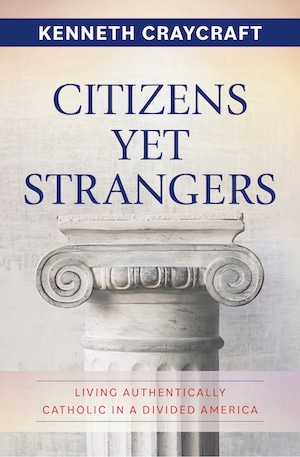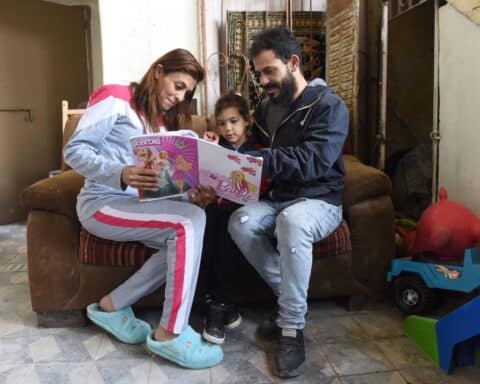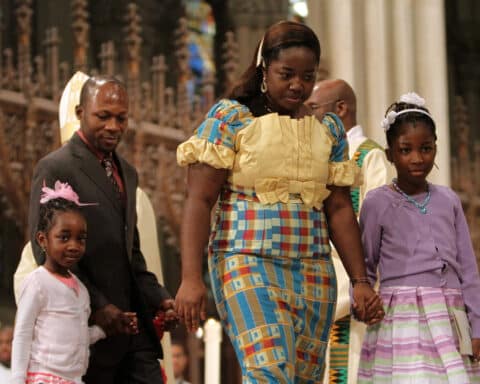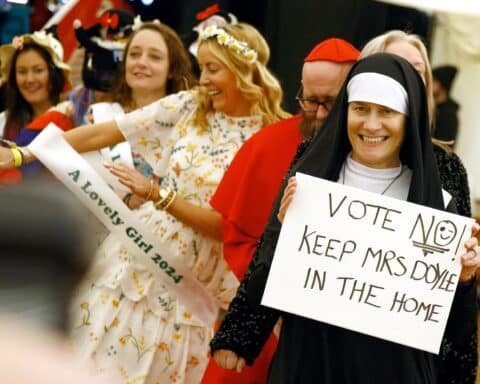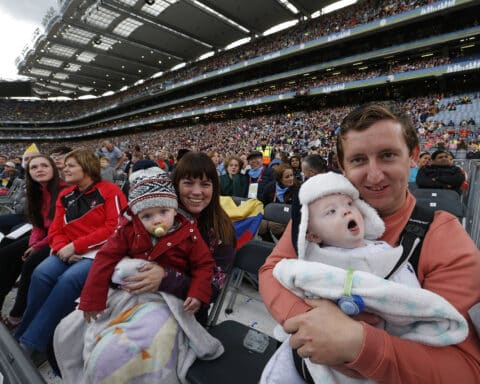The 2021 Grammy Award for Best Country Song was awarded to “Crowded Table,” from the eponymous debut album of the erstwhile quartet, “The Highwomen.” In a few short verses, the song, captures the place of the family in a consideration of the four pillars of Catholic social teaching: 1) the dignity of the human person; 2) the solidarity of all humankind; 3) the necessity of helping — or “subsidiary” — structures; and 4) the common good.
On the one hand, the song is a celebration of the family as a resilient community of love and fellowship. “I want a house with a crowded table / And a place by the fire for everyone / Let us take on the world while we’re young and able / And bring us back together when the day is done.” The various members of the family must eventually go their way in the world, to exercise their own moral agency. At the end of the proverbial day, however, may the ties that bind them bring them back to the family table and to gather around the fire. For this to happen, work must be done, the song continues:
If we want a garden, we’re gonna have to sow the seed
Plant a little happiness, let the roots run deep
If it’s love that we give then it’s love that we reap
If we want a garden, we’re gonna have to sow the seed.
While a natural community (as I will explain), the family requires proactive cultivation by its various members to fulfill its purpose as a community of reciprocal love.

On the other hand, however, “Crowded Table” acknowledges the frailty both of the family and its various members. As no person is without sin, so no family is perfect. Family solidarity is often tested by all sorts of stressful situations or behaviors. But as the first, most basic social community, the family is both the first place to which the wayward should be able to return and the place in which they should feel welcome. The standard, the song suggests, is not whether the family is faultless, but rather whether it is welcoming of those who have fallen, recognizing that we are all on the same continuum of brokenness and alienation. In a poetic expression of the Parable of the Prodigal Son, the song continues:
The door is always open
Your picture’s on my wall
Everyone’s a little broken
And everyone belongs
Yeah, everyone belongs.
The family is a source of consolation and forgiveness, rooted in the transparency and self-realization that we are all in need of reconciliation at some point by some person. No matter how alienated some members may feel from time to time, the picture stays on the wall and there’s always a place at the table.
The family in God’s plan
Two essential truths about the family emerge in this lovely song. First, the family is a natural community, bound by intrinsic spiritual, emotional and psychological bonds. The family is not created by laws or other conventional institutions, but rather is rooted in the very nature of humankind as the first and most basic human society. As Gaudium et Spes puts it, the family is “the primary form of interpersonal communion” (No. 12). But the family is not merely the invention of a contract between autonomous individuals. The family is not created or sustained by the agreement of its members, but rather exists by the very nature of the procreative and associative relationships without which no family could exist. “Its first task is to live with fidelity the reality of communion in a constant effort to develop an authentic community of persons,” explains Pope St. John Paul II in Familiaris Consortio (No. 18).

Second, the family is — or at least should be — the primary witness to the dignity of all persons, regardless of a particular member’s abilities, gifts or contributions. The family is a witness to our mutual dependency on one another, showing us that dignity is not compromised by the need for support and conciliation. “The family … is a community of persons: of husband and wife, of parents and children, of relatives,” teaches St. John Paul II (Familiaris Consortio, No. 18). Of course, particular families may be more or less faithful to that witness. But the relative fidelity of a particular family to its mission does not detract from the family’s primary purpose of teaching and witnessing to the dignity of all its members, even — if not especially — those members who most need patience and care. “By respecting and fostering personal dignity,” John Paul II continues, this care “takes the form of heartfelt acceptance, encounter and dialogue, disinterested availability, generous service and deep solidarity” (No. 43). Moreover, “Without love the family is not a community of persons and, in the same way, without love the family cannot live, grow and perfect itself as a community of persons” (No. 18).
“The family is important, and it is necessary for the survival of humanity. Without the family, the cultural survival of the human race would be at risk. The family, whether we like it or not, is the foundation.”
Pope Francis, interview for the radio of the Archdiocese of Rio, July 27, 2013
Considered together, these two features demonstrate that the family is the most fundamental human association. “In God’s plan,” teaches John Paul, the family “is the basic cell of society and a subject of rights and duties before the State or any other community” (No. 46). Thus, “the fostering of authentic and mature communion between persons within the family is the first and irreplaceable school of social life, an example and stimulus for the broader community relationships marked by respect, justice, dialogue and love” (No. 43). As noted above, the family is a “natural” society, which means that its existence and structure is given in the very fabric of creation. In the primordial Genesis narrative, woman and man are made for each other and told to be fruitful. In other words, the family of one man and one woman created for the two-fold vocation of fellowship and propagation is an essential aspect of creation.
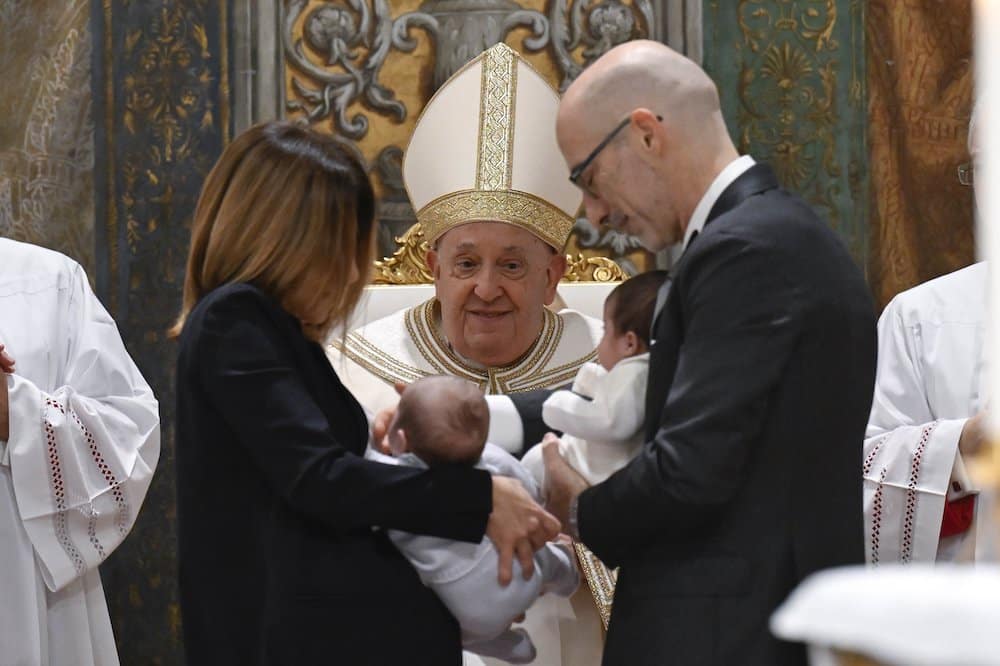
The family is the first natural society
According to the prevailing view in American law and politics, the family has no natural state or structure. Rather, like all other human relationships, the family is mere convention; it is a human invention that is as open to alteration or change as any other conventional structure. This is illustrated and instantiated in law by Supreme Court Justice Anthony Kennedy in his opinion in Obergefell v. Hodges, the 2015 decision that effectively invalidated states’ laws that protected the natural state of marriage. The Obergefell decision did not expand marriage to same-sex couples. Rather, it redefined marriage as whatever any two people decide it means. And nothing in Obergefell limits this decision to two people. Nor does it limit marriage to two people who are not otherwise already related. If marriage as a natural institution is replaced by a theory of marriage as nothing other than mere convention — the product of the exercise of the purported right to self-definition — there are no coherent arguments against any expression of this convention. Of course, if we already subscribe to the moral anthropology that reduces all human associations to negotiated assertions of self-assertive rights, we can’t really argue against such a view of “marriage.”
The family is a “natural” society, which means that its existence and structure is given in the very fabric of creation.
In contrast, the Catholic tradition considers the family one of the “three necessary societies,” along with the Church and civic community. “Now there are three necessary societies, distinct from one another and yet harmoniously combined by God, into which man is born,” explains Pope Pius XI in his 1929 encyclical, Divini Illius Magistri. “Two, namely the family and civil society, belong to the natural order; the third, the Church, to the supernatural order” (No. 11). As the first natural society, the family enjoys privilege over civil society, the latter of which exists for the purpose of supporting the family. As Pope Pius explains, “In the first place comes the family, instituted directly by God for its peculiar purpose, the generation and formation of offspring”; thus, the family “has priority of nature and therefore of rights over civil society” (No. 12).
The family is the first “helping” society, and therefore is first in the order of subsidiarity. This is a reminder that subsidiarity is not merely about solving problems or addressing issues, but also about proactive formation and education of the person. Every subsidiary structure — from the most basic at the level of the family, to the most remote at the level of international governments and non-governmental organizations — plays both roles. This is the case whether its participants realize it or not. Thus, we cannot overemphasize the importance of a well-formed and well-ordered family, consistent with its natural state.
“It is only the rock of total, irrevocable love between a man and a woman that can serve as the foundation on which to build a society that will become a home for all mankind.”
Pope Benedict XVI, address on May 11, 2006
If we lose the family, we lose the very foundation of natural human community. Thus, we must highlight the vital roles that other helping (“subsidiary”) structures should assume in prioritizing and supporting the family. As I discuss more fully below, Catholic social doctrine emphasizes the “subjectivity” of the family: The family exercises moral judgment and makes moral choices, similarly to the subjectivity of the individual. Because of this, other structures are often a necessary part of the overall ecology of the family. Whether establishing laws and regulations that support the family, or supplementing the role of families when they are otherwise unable to meet all their obligations, local, state, national and international governments also play critical roles in the structure and support of the family.
The Fourth Commandment
This elevation of the family as ordered toward love of God is instituted in the Fourth Commandment (the only of the 10 that contains a consequence for its observation): “Honor your father and your mother, that you may have a long life in the land the Lord your God is giving you” (Ex 20:12). A superficial, but not wrong, understanding of this commandment is that children are to respect and obey his or her parents. Certainly, one cannot honor one’s parents if one is disobedient to proper instruction or disrespectful at any time. But in the context of Israel’s rescue from 400 years of slavery in Egypt, and its delivery from that bondage by God’s agent, Moses, the meaning of the Fourth Commandment has richer and deeper implications about the role of the family.
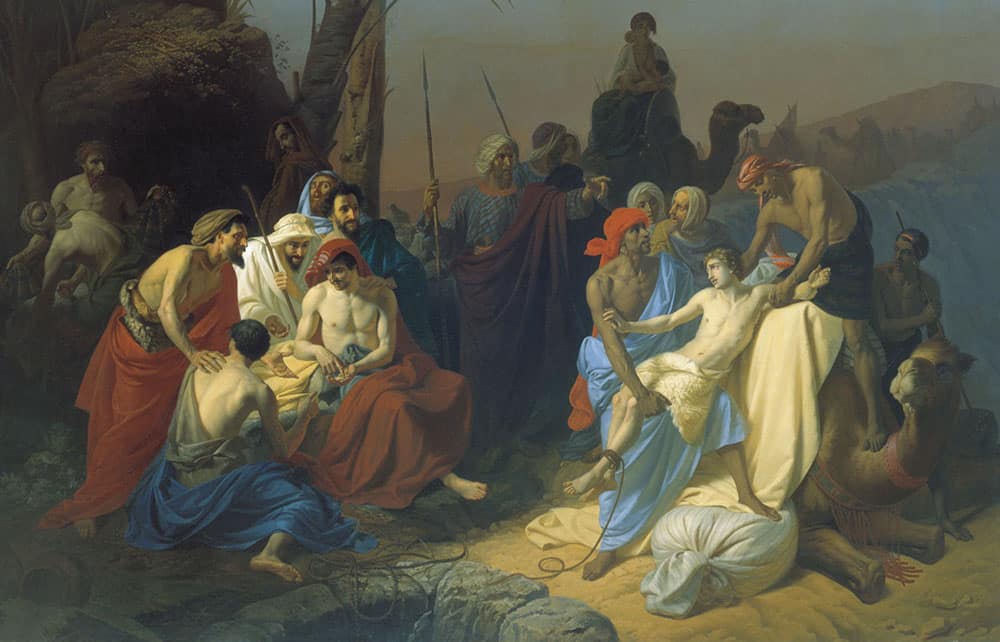
At the heart of Israel’s bondage in Egypt was the disintegration of the family of Abraham’s descendants. Jacob’s sons, motivated by jealousy of their brother Joseph, dishonored and deceived their father when they sold Joseph into slavery in Egypt. Of course, Joseph oversaw the growth, storage and distribution of the crops in Egypt, leading to the brothers’ request for mercy and asylum there. After Joseph and his brothers died and a new King of Egypt arose, that asylum became slavery, as recounted in the first chapter of Exodus.
Against this backdrop, the Fourth Commandment has a deeper meaning than mere respect or obedience to parents. It includes honoring the stories and traditions of the Jews for the purpose of sustaining their history. The Israelites know who they are because of the education received from their parents about their history and future purpose. Honoring that education is vital to sustaining their very existence as the people of God. Israel is created and sustained by the story. The descendants of Abraham, Isaac and Jacob continue the story by honoring their parents who tell it, and by communicating it to subsequent generations. They honor the story so that they will live long in the land that God gives them.
“Man is not really himself, however, except within the framework of society and there the family plays the basic and most important role.”
Pope St. Paul VI, Populorum progressio, No. 36
Of course, Christians understand that the Old Law is a “disciplinarian,” leading to its fulfillment in the life, death and resurrection of Jesus (cf. Gal 3:24-25). Yet the commandments are not nullified by this fulfillment. Rather, their whole purpose is revealed. For Christians, obeying the Fourth Commandment includes telling the story of the Church. This is the continuing way that the Church is sustained over time. Christians, no less than our Jewish parents before us, sustain the story by honoring those who communicate it and, in turn, communicating it to the next generation. This is not for the sake of the story itself, but rather to order our children toward love of God, and to honor our parents for their care in educating us in that love.

Teach your children well
This raises the important issue of what we teach our children, a lively public debate in recent years. Battles about curriculum in schools, the relative authority of parents to direct or approve of curriculum, and the rights of families to supervise their children’s education have created a lot of contentious debate. And, of course, ample evidence exists to raise alarms about the drift of education in both public and private contexts. Many Catholic parents have rightly objected to the content of public school curriculum, especially as it relates to issues of gender and sexuality. Homeschooling, school vouchers, charter schools and other alternatives have been on the rise as a response to these problems.
The family is the first teacher.
But we have to ask ourselves hard questions about the moral and political values that we teach our children when we remove them from public schools. We find ourselves in this predicament because of an education in liberal, self-actualizing individualism. But if we find an educational alternative that provides our children with the same formation in individualism and voluntaristic moral theory as they get in the public schools, how is this really an alternative? The family is the first teacher. But we must be able to distinguish the basic moral values of modern liberalism from the classic notions of virtue rooted in the Catholic theological tradition. Otherwise, we cannot lay a truly Catholic educational foundation. We cannot simultaneously object to the inevitable result of an education in liberal individualism while teaching the same moral language to our children, but with a veneer of the Catechism painted over it. Education is the family’s prerogative, but we must pay attention to what we are instilling: Is it discipleship to Christ or loyalty to American individualism?
Education is the family’s prerogative, but we must pay attention to what we are instilling: Is it discipleship to Christ or loyalty to American individualism?
The answer is crucial because the broader society has an interest in a proper definition of the family and institutional support of it. Our witness to the primacy of a Christian understanding of the family is not limited to the education of our children. In our expressions of political opinions and choices of public-policy options, do we advocate a public witness for the family? Or do we tend to privatize the family in the same way that we tend to privatize individual morality? In other words, are our commitments to public and political theories about the family formed by partisan political loyalty or by the full implications of the family as the first subsidiary institution within the larger framework of public and political life? We cannot coherently advocate for the family as a strong example of social solidarity while supporting individualist or libertarian political theories that undermine that advocacy.
Guiding civic responsibility
This raises important questions about how we vote to collect and spend public resources, and for whom we vote to make policy about the use of those resources. The family is the “first and vital cell of society,” explains Pope St. John Paul II (Familiaris Consortio, No. 42). Thus, “the family has vital and organic links with society,” he continues. “It is from the family that citizens come to birth, and it is within the family that they find the first school of the social virtues that are the animating principle of the existence and development of society itself” (No. 42). Thus, society at large — not only Catholic Christians — have a stake in the well-being and proper ordering of the family. “The family is by nature and vocation open to other families and to society” (No. 42). The common good is served by a robust understanding of the essential and natural nature of the family.
And because we are charged with ordering our lives in accord with the Gospel, it is only natural for us to advocate policies, programs and civic structures that are consistent with that order. Indeed, the social subjectivity of the family as the first subsidiary structure necessarily implies that the broader society must defer to the priority of the family. This includes legal and regulatory structures that acknowledge and support the integrity of the family and its precedence in social consideration. “Therefore, neither society nor the State may absorb, substitute or reduce the social dimension of the family,” explains the Compendium of Social Doctrine of the Church. “[R]ather, they must honor it, recognize it, respect it and promote it according to the principle of subsidiarity” (No. 252). The family is the first “helping” society; all other social structures are ordered toward the well-being of the family.
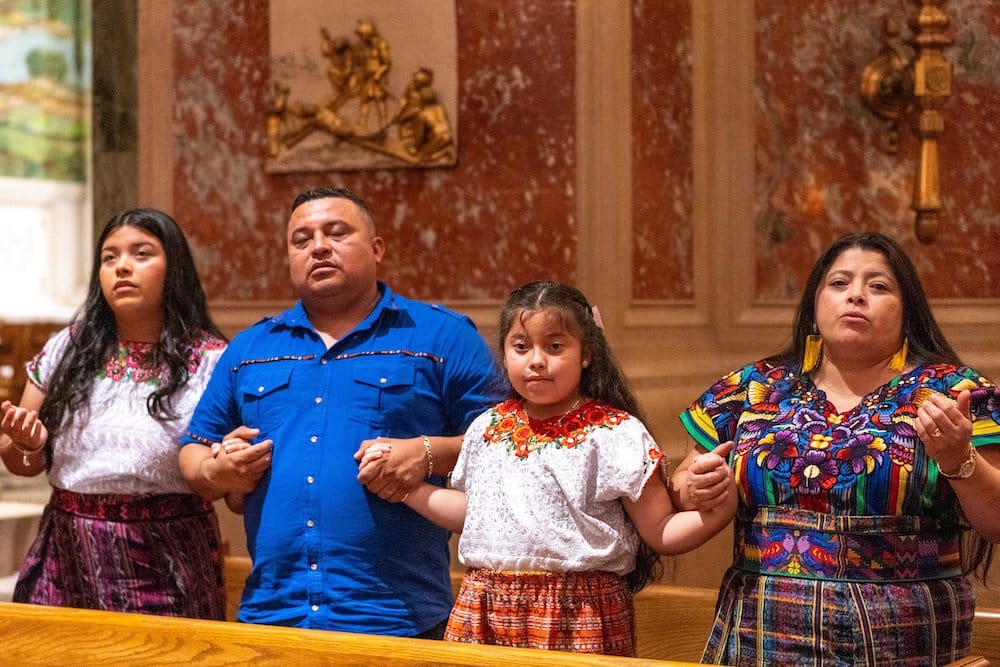
This mandate must include the consideration of a host of policies that support the family without replacing its essential, natural place in society. To take the Church’s doctrine of the family seriously, we must rethink our positions on such highly contentious issues, including: 1) subsidized or free birth; 2) legally mandated paid family leave; 3) subsidized child care for single parents (or where it is necessary for both parents to work outside the home); 4) family wages in the labor market; 5) remuneration or in-kind support for stay-at-home parents; 6) guaranteed minimum incomes; and 7) the language we use in our opposition to abortion.
| For Continued Reading |
|---|
|
“Citizens Yet Strangers: Living Authentically Catholic in a Divided America“ (OSV, $26.95) by Kenneth Craycraft “Citizens Yet Strangers” resets the framework of how we engage with politics as Catholics. Author Kenneth Craycraft explains how Catholic theology transcends partisan politics, and he challenges Catholics to move away from the individualist liberal impulses of American political identity, whether on the left or the right. Avoiding the common clichés that prevent us from examining the role our faith should play in our public actions, this book dives deeper into the very way we orient our moral and political lives. |
Many of these policies will not fit with either of the two major political parties in the United States. And even within the four-fold principles of Catholic social doctrine, prudential considerations may permit a wide variety of policies and the means to implement them. But, the policy positions we advocate and embrace as Catholics will be a test of whether our policy preferences are more informed by Catholic moral reflection or partisan loyalty. The proper answers are not a middle way between the left and right wings of American liberalism. Rather, they are rooted in a fundamental commitment to the four pillars of Catholic social doctrine and the policy implications that flow from them.


